The birth of the New Year was celebrated with the usual razzmatazz. In London, revellers welcomed the start of a new decade with fireworks displays, as did many people in Edinburgh and other major cities. No doubt, Britain’s new Prime Minister Boris Johnson was celebrating even more enthusiastically than most other people. Having won the 2019 general election with a handsome majority, he is now free to lead the nation to a successful conclusion of the Brexit negotiations. That, at least, is the theory.
The reality, however, is rather different.
The serious strategists of capital are looking to the future, not with enthusiasm, but with dread. Reading the pages of the financial press, one cannot help recalling the phrase of Berthold Brecht: “He who laughs has not yet heard the bad news.” On 1 January, the Economist delivered a sombre verdict on the perspectives of the world economy:
“Global growth in 2019 was the slowest since the financial crisis of 2008-09. The world’s GDP rose by roughly 2.2%. This year will be little better, according to the latest estimates from the Economist Intelligence Unit (EIU), a sister company of The Economist. The EIU forecasts that the global economy will expand by 2.4% in 2020.
“Rich economies are expected to grow at roughly the same lacklustre pace as they did in 2019—the euro zone’s, almost exactly the same: 1.3%, against 1.2% last year. The EIU sees a fairly sharp slowdown in America, from 2.3% to 1.7%, as trade tensions continue to depress trade and investment.
“A continuation of the global slowdown in manufacturing will also drag down growth worldwide. A no-deal Brexit could make matters worse, for Britain and its trading partners.”
A no-deal Brexit is by no means impossible. Boris Johnson’s electoral success appears to have rendered him even more stupid and irresponsible than he was before. His first act upon re-entering Number 10 Downing Street (the Prime Minister’s residence) was to move a bill that would make it unlawful for Britain to prolong its negotiations with the EU beyond December 2020.
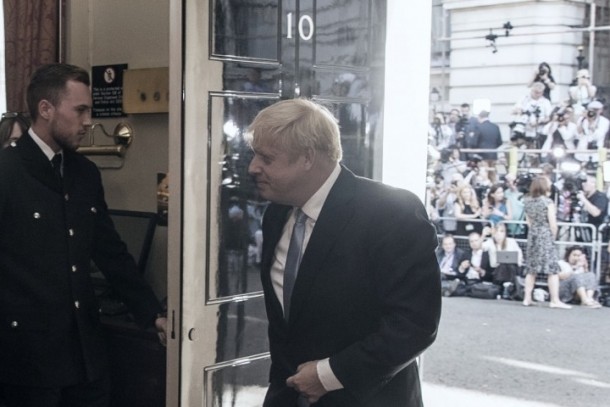
Since everyone (except the Mad Hatter’s Tea Party that now rules the UK) is well aware that it is impossible to conclude a very complex trade deal in 12 months, this amounts to an act of collective insanity. Britain has been teetering on the edge of an abyss for the past 12 months. But now, under the bold leadership of Tsar Boris the first, we are about to take one step forward.
The euphoria that gripped the bankers and capitalists when they realised that Jeremy Corbyn would not be the next prime minister of Britain did not last very long. The pound sterling first rose, then plummeted as the financial centres of the world realised that Britain had jumped out of the frying pan and straight into the fire.
The alarm on the world stock exchanges is well-founded. A no-deal Brexit would be a disaster for Europe, a catastrophe for Britain and would have serious effects on the world economy which, despite all the triumphalist propaganda, now finds itself in an extremely fragile state. Any serious shock (a no-deal Brexit, a war in the Middle East…) could plunge it into a deep recession – even deeper and more serious than the crisis of 2008.
Once the reality of the situation becomes clear to the people of Britain, the support for the Conservatives (which, in reality, is very superficial in any case) will evaporate like a drop of water on a hot stove. Boris Johnson will not be able to keep his promises in the context of an economic crisis that will flow directly from the imbecilic policy he and the Brexiter gang that now controls the Tory party are determined to pursue.
But hey! Why bother our brains about future catastrophes that have yet to come? Live for the moment! Enjoy yourselves! Eat, drink and be merry, for tomorrow… Well, that is another matter. Suffice it to say that, on the night of 31 December, the champagne flowed and the skyline of London was lit up by the glorious sight 12,000 exploding fireworks.
Fireworks in New York – and in Baghdad
Meanwhile, a few thousand miles across the Atlantic, more than a million people gathered to celebrate New Year in the area surrounding Times Square. This event takes place every year. But this year, there was a difference.
For the first time, the New York police were planning to use a surveillance drone to monitor the annual party in Times Square. In addition to the drone, the NYPD said it would deploy thousands of cameras, officers and other security measures to keep party-goers safe. “You will see a lot of officers with a lot of gear and long guns,” said Police Commissioner James O’Neill.
These extraordinary measures are a graphic expression of a new mood of insecurity that is gradually taking grip of US society. This mood, in turn, reflects the extreme instability on a world scale, in which America is being sucked into conflicts on many fronts.
The destruction of the Twin Towers in the 9/11 terrorist attack was a grim warning of what could happen to the United States as a result of its entanglement in global contradictions, especially in the Middle East. This instability has been greatly exacerbated by the unpredictable actions of the present occupant of the White House.
As it happens, the aforementioned drone was never used on New Year’s Eve. The reason was adverse weather conditions. President Trump may be the most powerful man in the world, but it seems that even he cannot control the weather. Police chief Terence Monahan said the drone could not be safely deployed because of heavy rain and wind. Instead, police used helicopters to keep an eye on the party from above.
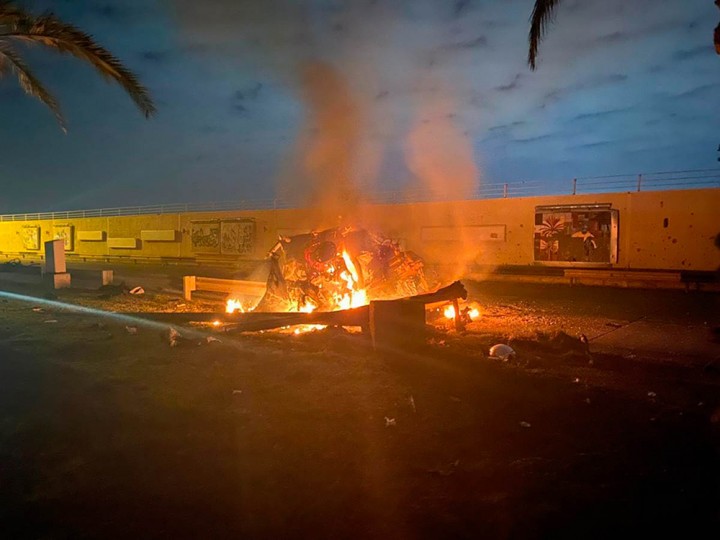
With or without the drone, the party proceeded without any serious incident. The crowds of people enjoyed the spectacle of fireworks. But a few days later, in faraway Baghdad, the skyline was soon lit up by another, deadlier kind of fireworks. After nearly coming to blows in 2019, America and Iran celebrated the new year to the sound of war drums.
The escalation began on 27 December, when dozens of missiles, allegedly fired by an Iranian-backed militia in Iraq called Kataib Hizbullah, struck an Iraqi military base in Kirkuk, killing an American contractor and wounding American and Iraqi soldiers. Two days later, America responded, over objections from the Iraqi government, with air strikes on Iraqi soil that killed at least 25 militia members and wounded over 50.
After thousands of militiamen and protesters then attacked the American embassy in Baghdad, President Donald Trump said Iran would be held responsible. “They will pay a very BIG PRICE!” tweeted Mr Trump. “This is not a Warning; it is a Threat. Happy New Year!”
Mr Trump was as good as his word. On 3 January, he issued the order for the assassination of the Iranian general Qasem Soleimani by a drone strike in Baghdad. By this action, the American president immediately plunged the world, and particularly the Middle East, into a deep crisis.
Not content with ripping up the nuclear deal with Iran, which had been painfully put together after years of diplomacy, Trump is hellbent on provoking the regime in Tehran to the nth degree. In so doing, he has shown his complete contempt for America’s so-called allies, who were not consulted about this new adventure, although it affects their interests in a very direct way.
The reaction of even the most right-wing commentators was universally negative. The reactionary Tory Sunday Mail immediately published an article with the headline:
“The killing of Iranian General Qasem Soleimani was state murder. How can anyone be so bloody stupid?”
Who can be so “bloody stupid”? Well, Donald J. Trump, of course: the bosom pal of Boris Johnson, whom the Sunday Mail so greatly admires.
This is not the place to discuss events in the Middle East. That was dealt with very well on this website yesterday. Suffice it to say, that the latest events only served to underline the extreme turbulence and instability that now exists on a world scale and at all levels: financial, economic, social, political, diplomatic and military.
These are all symptoms of a diseased socio-economic system that has outlived its usefulness and constitutes a permanent threat to the existence of human civilisation, if not to the very future of the planet itself.
Australia in flames
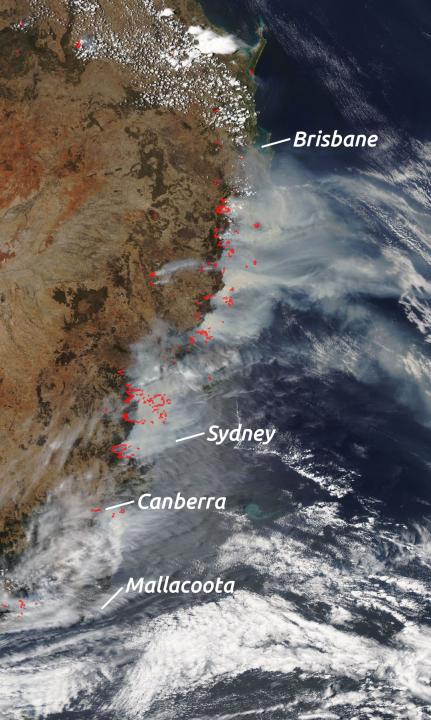
One of the most spectacular fireworks displays on New Year’s Eve always takes place in Sydney. This year was no exception, despite the fact that a number of other fireworks displays across the country were scrapped. Australia has been ravaged by terrifying bushfires intensified by high temperatures and months of drought.
Since September, blazes in eastern Australia have killed six people, destroyed more than 700 homes and blanketed towns and cities (including Sydney) in smoke. So huge are the clouds caused by the blaze but they can be seen from outer space and have reached as far as New Zealand.
Critics of the Sydney display opposed it on the grounds that it would send the wrong message. They urged the organisers to call it off and instead donate the money to farmers and the fire service. But why let a national disaster that has cost the lives and homes of countless citizens interfere with a big party? The fireworks display in Sydney went ahead as planned.
The Emperor Nero was said to have played his lyre and sang songs while Rome burned. Following in the footsteps of his venerable predecessor, Sydney’s Lord Mayor defended the decision to press ahead with the city’s New Year’s Eve fireworks display. Ms Moore told a press conference that New Year’s Eve was an important celebration that would “give hope to people at a terrible time”.
That’s the spirit! Australians must keep on smiling, even when their homes are reduced to ashes, their cities choke with dense clouds of poisonous fumes and an unknown number of charred corpses lie under the ruins. The most important thing is to keep up the spirits – and above all, keep up the profit margins of the hoteliers, bankers and capitalists.
The issue of profitability was obviously utmost in the minds of the mayor, who reminded us that: “Many people have already flown in and paid for hotels and restaurants, travelling from all over the world to be here for tonight’s New Year’s Eve. It generates A$130m (£69m; $91m) for the NSW economy, powers our tourism industry, creates jobs and supports countless small businesses.”
Scott Morrison’s Hawaiian holiday
Only eight months ago, Scott Morrison, the leader of the Australian Liberal Party, was being hailed as a political mastermind for snatching victory in an election he was widely expected to lose, in part because of his enthusiastic support for the country’s powerful coal industry.
How times have changed! As temperatures rise and the crisis rages on, many Australians have accused the prime minister of failing to provide reassurances or support to fire-hit communities. Mr Morrison and his government have also faced a mounting backlash over their climate policies.
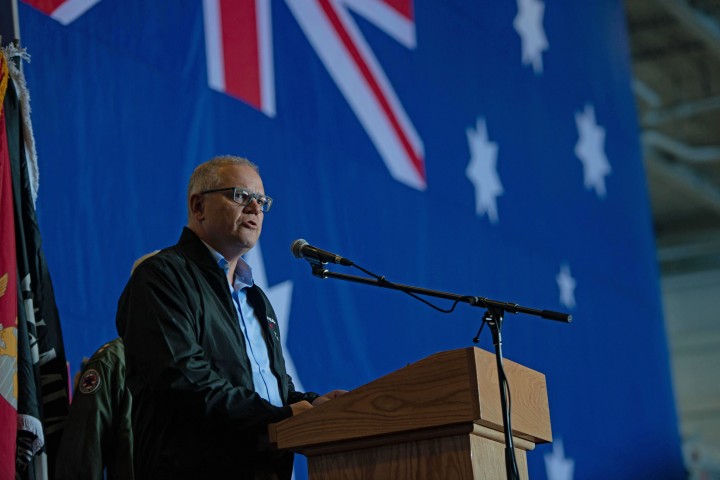
The Australian Prime Minister now stands accused of downplaying the severity of the crisis. This seems a little unfair. Did he not cancel his well-deserved holidays in order to tour the fire zones? Well, yes, he did, although, truth to tell, this decision was not taken lightly, but only after careful consideration and a lot of bad publicity in the press.
Mr Morrison’s decision to go on holiday with his family was met with a predictably angry reaction in the media and on social media, which suggested that he should not be “missing in action” at a time of crisis escalated, particularly as he had once been critical of a fire commissioner for doing the same.
Mr Morrison’s office initially denied that he was in Hawaii, but a picture was published on social media, apparently showing him posing with other tourists on a beach drinking a beer, seemed to cast some doubt on the veracity of these indignant denials. Phrases such as #WhereisScoMo, and #FireMorrison were widely reproduced online.
Finally, the PM confirmed he was indeed in Hawaii but was returning early. This belated announcement came shortly after two firefighters – both volunteers and fathers of young children – had been killed. They were the first firefighters to die in the crisis.
“Given these most recent tragic events, I will be returning to Sydney from leave as soon as can be arranged,” he said in a statement. One might even say that the Prime Minister only jumped when the flames were singeing his backside. But the leader of the “opposition”, Mr Albanese, said the PM was “entitled to a holiday”, but criticised the “lack of information and transparency”. Now there’s fighting talk for you!
The PM offers the victims – his prayers
Having made the ultimate sacrifice of reluctantly vacating his Hawaiian hideaway, Mr Morrison proved to be most generous in his praise for the volunteer firefighters, most of whom are trained – which is good – but also unpaid – which is even better.
These courageous men and women are daily risking their lives to fight this towering inferno. Some have lost their lives in the flames. But Mr Morrison is clearly of the opinion that virtue is its own reward. He has firmly rejected calls for greater funding of firefighters, saying existing resources were sufficient and that volunteers “want to be there”.
However, the Prime Minister is able to show his generosity and humanity in other ways. He has been quick to offer the victims of this inferno – his “thoughts and prayers”. Now, thoughts and prayers, as we all know, are fairly inexpensive. But when it comes to money for the distressed people, and guarantees of insurance, Mr Morrison suddenly falls silent, probably because silence is highly conducive to the efficacy of prayer.
So far, sad to say, the Prime Minister’s prayers seem to have gone unanswered. Temperatures have soared to new heights and the fires continued to spread alarmingly, devastating whole communities. The navy has had to be called in to rescue people from the beaches in areas consumed by the flames. The number of people who’ve lost their lives is as yet unknown. But a large number of people have lost their homes and all their possessions.
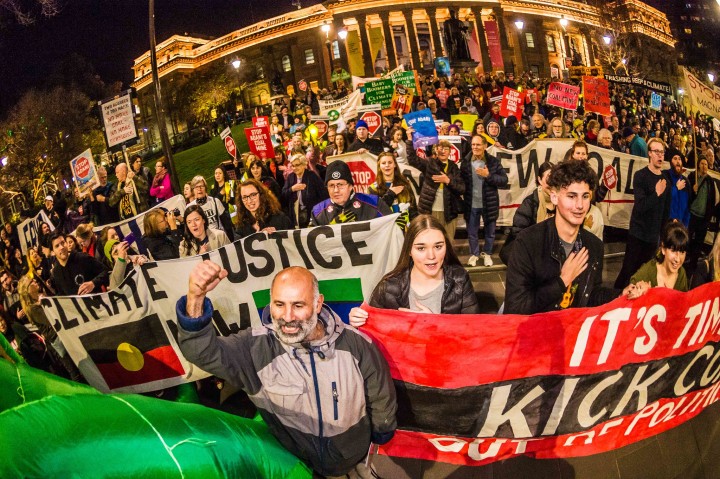
Meanwhile, thousands of people came out onto the streets of Sydney, where the air quality has been pushed to hazardous levels. One woman, whose house had been destroyed by a bushfire, stood outside the parliament building in Canberra with a handwritten placard saying simply: “Morrison, your climate crisis destroyed my home.”
Australia, with its coal-dependent economy, has one of the highest per-capita greenhouse gas emission rates globally. The 2020 climate change performance index ranked Australia last out of 57 countries for its climate policy, saying it had gone backwards under the Morrison government.
The vast, untapped coal reserve in north-eastern Australia had for years been the object of desire for the Indian industrial giant Adani. In June, when the Australian government granted the company approval to extract coal from the reserve, they weren’t just rewarding its lobbying and politicking, they were also opening the door for Adani to realise its grand plan for a coal supply chain that stretches across three countries.
Coal from the Australian operation, known as the Carmichael project, would be transported to India, where the company is building a new power plant for nearly $2 billion to produce electricity. That power would be sold next door in Bangladesh. Adani’s victory in Australia helped to ensure that coal will remain woven into the economy and lives of those three countries (which together have a quarter of the planet’s population) for years, if not decades.
But these concerns are dismissed by the Liberal government. Australia’s deputy prime minister has said the country should “absolutely” continue to use and exploit its coal. Deputy PM Michael McCormack rejected such questions as the concerns of “raving inner-city lefties”, adding: “We’ve had fires in Australia since time began.” Maybe so, but not on such a fast and devastating scale as the present conflagration.
Under capitalism, the long-term interests of the environment and the future of the human race itself come a very poor second after rent, interest and profit. Profit must come first, always. The lives, health and security of ordinary people can never interfere with the greed of the capitalists for surplus value.
The attitude of these bourgeois politicians to the fate of millions of ordinary Australians is characteristic of the contempt that is shown by big business and its political representatives in all countries. All that is required is for somebody to hand Mr McCormick and his boss a second-hand lyre and a sheet of verses by the Emperor Nero. Then, the picture would be complete.

